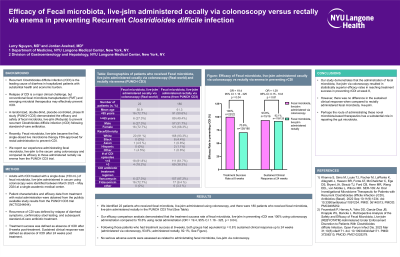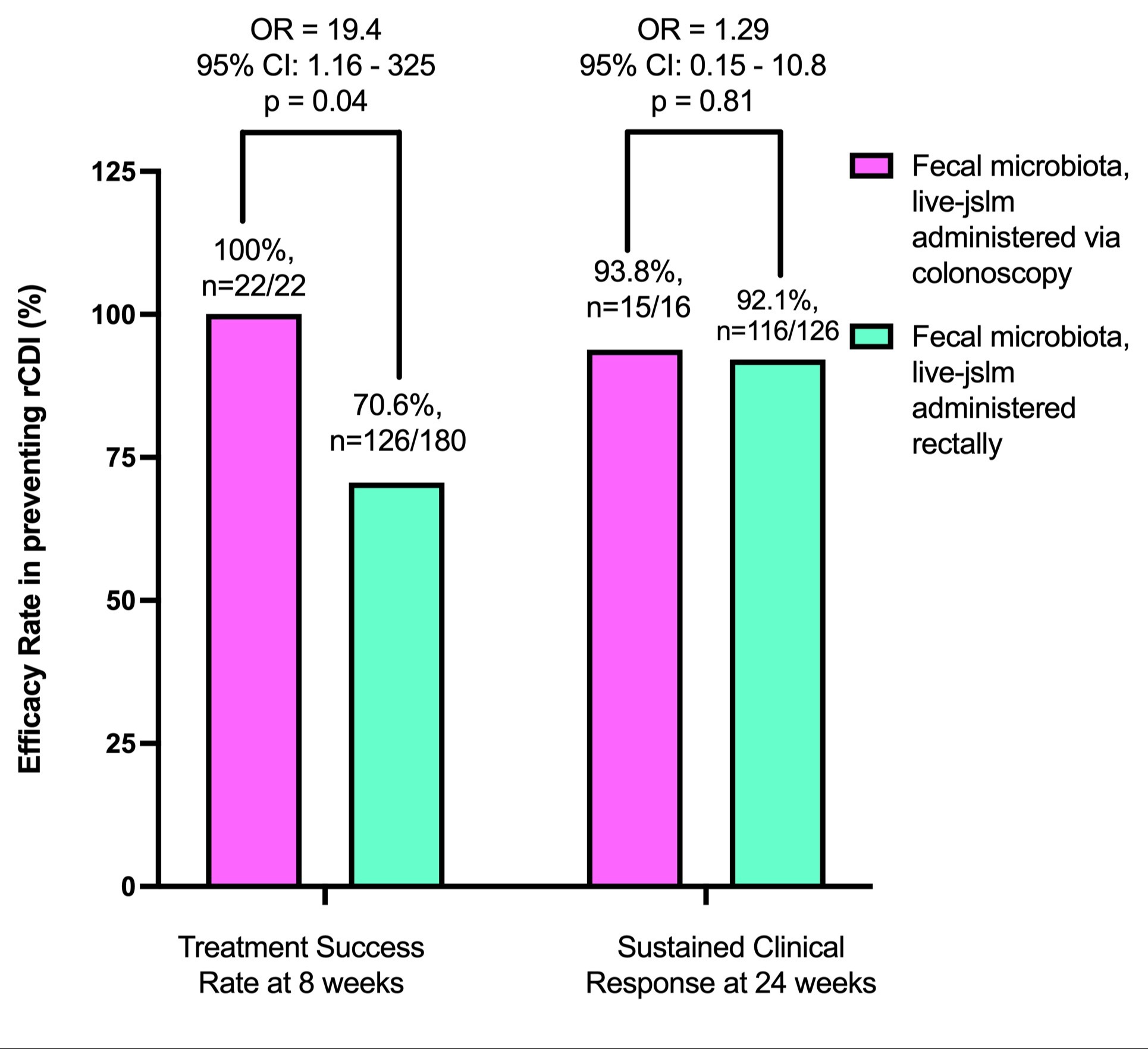Sunday Poster Session
Category: Colon
P0237 - Efficacy of Fecal Microbiota, live-jslm Administered Cecally via Colonoscopy vs Rectally via Enema in Preventing Recurrent Clostridioides difficile Infection
Sunday, October 27, 2024
3:30 PM - 7:00 PM ET
Location: Exhibit Hall E

Has Audio

Larry Nguyen, MD
NYU Grossman School of Medicine
New York, NY
Presenting Author(s)
Larry Nguyen, MD, Jordan Axelrad, MD, MPH
NYU Grossman School of Medicine, New York, NY
Introduction: A randomized, double-blind, placebo-controlled, phase III study (PUNCH CD3) demonstrated the efficacy and safety of fecal microbiota, live-jslm to prevent recurrent Clostridioides difficile infection (rCDI) following standard-of-care antibiotics. Recently, Fecal microbiota, live-jslm became the first, single-dosed live microbiome therapy FDA-approved for rectal administration to prevent rCDI. We report our experience administrating fecal microbiota, live-jslm to the cecum using colonoscopy and compared its efficacy to those administered rectally via enema from the PUNCH CD3 trial.
Methods: Adults with rCDI treated with a single dose (150 mL) of fecal microbiota, live-jslm administered in cecum using colonoscopy were identified between March 2023 – May 2024 at a single-academic medical center. Patient characteristics and efficacy data from treatment with rectal administration were obtained from the publicly available study results from the PUNCH CD3 trial (NCT03244644). Recurrence of CDI was defined by relapse of diarrheal symptoms, confirmatory stool testing, and subsequent standard-of-care antibiotic treatment. Treatment success was defined as absence of rCDI after 8-weeks post-treatment.
Results: We identified 22 patients who received fecal microbiota, live-jslm administered using colonoscopy, and there were 180 patients who received fecal microbiota, live-jslm administered rectally in the PUNCH CD3 Trial (See Table). Our efficacy comparison analysis demonstrated that the treatment success rate of fecal microbiota, live-jslm in preventing rCDI was 100% using colonoscopy administration compared to 70.6% using rectal administration (OR = 19.4, 95% C.I 1.16 - 325, p = 0.04). Following those patients who had treatment success at 8-weeks, both groups had equivalent (p = 0.81) sustained clinical response up to 24 weeks (administered via colonoscopy, 93.8%; administered rectally, 92.1%; See Figure). No serious adverse events were assessed as related to administrating fecal microbiota, live-jslm via colonoscopy.
Discussion: Our study demonstrates that the administration of fecal microbiota, live-jslm via colonoscopy resulted in statistically superior efficacy rates in reaching treatment success in preventing rCDI at week 8, but there was no difference in the sustained clinical response when compared to rectally administered fecal microbiota, live-jslm. Perhaps the route of administrating these novel microbiota-based therapeutics has a substantial role in repairing the gut microbiota.

Note: The table for this abstract can be viewed in the ePoster Gallery section of the ACG 2024 ePoster Site or in The American Journal of Gastroenterology's abstract supplement issue, both of which will be available starting October 27, 2024.
Disclosures:
Larry Nguyen, MD, Jordan Axelrad, MD, MPH. P0237 - Efficacy of Fecal Microbiota, live-jslm Administered Cecally via Colonoscopy vs Rectally via Enema in Preventing Recurrent <i>Clostridioides difficile</i> Infection, ACG 2024 Annual Scientific Meeting Abstracts. Philadelphia, PA: American College of Gastroenterology.
NYU Grossman School of Medicine, New York, NY
Introduction: A randomized, double-blind, placebo-controlled, phase III study (PUNCH CD3) demonstrated the efficacy and safety of fecal microbiota, live-jslm to prevent recurrent Clostridioides difficile infection (rCDI) following standard-of-care antibiotics. Recently, Fecal microbiota, live-jslm became the first, single-dosed live microbiome therapy FDA-approved for rectal administration to prevent rCDI. We report our experience administrating fecal microbiota, live-jslm to the cecum using colonoscopy and compared its efficacy to those administered rectally via enema from the PUNCH CD3 trial.
Methods: Adults with rCDI treated with a single dose (150 mL) of fecal microbiota, live-jslm administered in cecum using colonoscopy were identified between March 2023 – May 2024 at a single-academic medical center. Patient characteristics and efficacy data from treatment with rectal administration were obtained from the publicly available study results from the PUNCH CD3 trial (NCT03244644). Recurrence of CDI was defined by relapse of diarrheal symptoms, confirmatory stool testing, and subsequent standard-of-care antibiotic treatment. Treatment success was defined as absence of rCDI after 8-weeks post-treatment.
Results: We identified 22 patients who received fecal microbiota, live-jslm administered using colonoscopy, and there were 180 patients who received fecal microbiota, live-jslm administered rectally in the PUNCH CD3 Trial (See Table). Our efficacy comparison analysis demonstrated that the treatment success rate of fecal microbiota, live-jslm in preventing rCDI was 100% using colonoscopy administration compared to 70.6% using rectal administration (OR = 19.4, 95% C.I 1.16 - 325, p = 0.04). Following those patients who had treatment success at 8-weeks, both groups had equivalent (p = 0.81) sustained clinical response up to 24 weeks (administered via colonoscopy, 93.8%; administered rectally, 92.1%; See Figure). No serious adverse events were assessed as related to administrating fecal microbiota, live-jslm via colonoscopy.
Discussion: Our study demonstrates that the administration of fecal microbiota, live-jslm via colonoscopy resulted in statistically superior efficacy rates in reaching treatment success in preventing rCDI at week 8, but there was no difference in the sustained clinical response when compared to rectally administered fecal microbiota, live-jslm. Perhaps the route of administrating these novel microbiota-based therapeutics has a substantial role in repairing the gut microbiota.

Figure: Efficacy of Fecal microbiota, live-jslm administered via colonoscopy verses rectal in preventing rCDI
Note: The table for this abstract can be viewed in the ePoster Gallery section of the ACG 2024 ePoster Site or in The American Journal of Gastroenterology's abstract supplement issue, both of which will be available starting October 27, 2024.
Disclosures:
Larry Nguyen indicated no relevant financial relationships.
Jordan Axelrad: Abbvie – Consultant. Adiso – Consultant. Biomerieux – Consultant. BMS – Consultant. Fresenius – Consultant. Genentech – Grant/Research Support. Janssen – Consultant. Pfizer – Consultant.
Larry Nguyen, MD, Jordan Axelrad, MD, MPH. P0237 - Efficacy of Fecal Microbiota, live-jslm Administered Cecally via Colonoscopy vs Rectally via Enema in Preventing Recurrent <i>Clostridioides difficile</i> Infection, ACG 2024 Annual Scientific Meeting Abstracts. Philadelphia, PA: American College of Gastroenterology.
